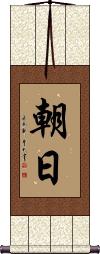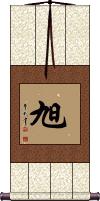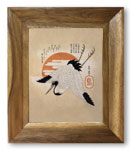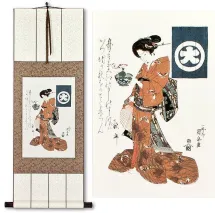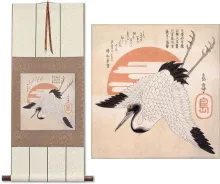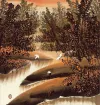Many custom options...
And formats...

Asahi Morning Sun in Chinese / Japanese...
Buy an Asahi Morning Sun calligraphy wall scroll here!
Personalize your custom “Asahi Morning Sun” project by clicking the button next to your favorite “Asahi Morning Sun” title below...
Asahi / Morning Sun
朝日 is a version of the Japanese name Asahi.
This can also be Ahisa, Asuka, Ashita, or Asaka. This means morning sun and is the name of the famous beer company in Japan.
This would be read as “Zhao Ri” in Mandarin where it means morning sun but is also known to be the Asahi company (maker of beer and other beverages).
Morning Sun
This Chinese, Japanese, and old Korean character means morning sun, dawn, or rising sun.
It can also be the Japanese surname Kyoku or Asahi.
This in-stock artwork might be what you are looking for, and ships right away...
Gallery Price: $61.00
Your Price: $33.88
Gallery Price: $61.00
Your Price: $33.88
Gallery Price: $61.00
Your Price: $33.88
Gallery Price: $61.00
Your Price: $33.88
Gallery Price: $90.00
Your Price: $49.88
Gallery Price: $96.00
Your Price: $52.88
Gallery Price: $96.00
Your Price: $52.88
Gallery Price: $120.00
Your Price: $79.88
Gallery Price: $120.00
Your Price: $79.88
Gallery Price: $72.00
Your Price: $39.88
Not the results for Asahi Morning Sun that you were looking for?
Below are some entries from our dictionary that may match your Asahi Morning Sun search...
| Characters If shown, 2nd row is Simp. Chinese |
Pronunciation Romanization |
Simple Dictionary Definition |
朝日 see styles |
zhāo rì zhao1 ri4 chao jih noboru のぼる |
More info & calligraphy: Asahi / Morning Sun(company) (place) (surname) (feminine speech) Asahi; (male given name) Noboru |
Variations: |
asahi あさひ |
(See 夕日) morning sun |
The following table may be helpful for those studying Chinese or Japanese...
| Title | Characters | Romaji (Romanized Japanese) | Various forms of Romanized Chinese | |
| Asahi Morning Sun | 朝日 | asahi | zhāo rì zhao1 ri4 zhao ri zhaori | chao |
| Morning Sun | 旭 | asahi | xù / xu4 / xu | hsü |
Successful Chinese Character and Japanese Kanji calligraphy searches within the last few hours...
